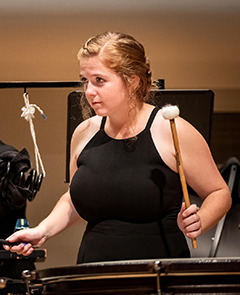by
Rhythm Scene Staff
| Sep 23, 2022
 Scarlett Maples will be a junior at the University of Alabama this fall. She is majoring in Music Education with two minors in Psychology and Educational Policy and Reform. At UA, she has been a member of the University Band, Concert Band, Symphonic Band, Wind Ensemble, Music Education Ensemble, Tuscaloosa Youth Orchestra, and the Million Dollar Band. Scarlett is also a member of the Percussion Studio and Percussion Ensemble, performing at PASIC 2021. Scarlett was a front ensemble member of the Academy Drum and Bugle Corps for their 2022 season and teaches private lessons, band camps, and drum major clinics in the Tuscaloosa area.
Scarlett Maples will be a junior at the University of Alabama this fall. She is majoring in Music Education with two minors in Psychology and Educational Policy and Reform. At UA, she has been a member of the University Band, Concert Band, Symphonic Band, Wind Ensemble, Music Education Ensemble, Tuscaloosa Youth Orchestra, and the Million Dollar Band. Scarlett is also a member of the Percussion Studio and Percussion Ensemble, performing at PASIC 2021. Scarlett was a front ensemble member of the Academy Drum and Bugle Corps for their 2022 season and teaches private lessons, band camps, and drum major clinics in the Tuscaloosa area.
R!S: How do you find new pieces that you are interested in playing? What factors do you consider when seeking out and/or choosing new solo or chamber repertoire?
Scarlett Maples: I typically enjoy playing lesser-known solo pieces so that I can musically shape and craft it the way that I'd like to, instead of having a preconceived idea of how it should go. When looking for repertoire, I often ask older students in my studio for suggestions or take up the search on YouTube and/or Spotify. Recently, I've also found that Instagram is a great way to find new repertoire.
R!S: What changes about the way you play a piece as you “live” with it for a while? Do you typically perform a piece once or multiple times?
SM: As I live with a piece for a while, I definitely get more comfortable with it and don't have to focus as much on the technical aspects, allowing me to spend my efforts tweaking and building the musicality behind it. It also gives me the time to experiment, trying new things or taking risks with it, to make it MY piece and MY performance, something that my professor encourages us to do. Usually, I perform a piece once or twice and then move on from there, starting a new piece the following semester.
R!S: How involved and in what ways is your instructor involved in your repertoire selection?
SM: I very much like to find my own solo repertoire. Obviously, it must fit within my physical limits as a younger percussionist, but I typically provide my professor, Dr. Lynge, with a list of pieces that I like around week two of the semester, and he chooses one that he feels would best help me further my technique and musicality. As for percussion ensemble repertoire, Dr. Lynge is always open to suggestions and ultimately chooses things that he thinks will be fun and challenging for us to play together.
R!S: Do you finish every piece that you start to learn? If not, why not? If a piece seems like a poor fit or you struggle unusually with it, how do you proceed? Do you “bail” on the selection or what changes do you make to allow yourself to complete it?
SM: I was actually presented with this scenario this past spring semester. Dr. Lynge chose a solo marimba piece that I didn't necessarily vibe with for my jury, and I struggled for the first half of the semester to learn it because it honestly felt like a chore to be in the practice room on it. I got to my lesson after spring break, and he could immediately tell there was a disconnect between myself and the piece. We had a conversation about it and switched my piece so that I could enjoy finishing a solo from the previous semester. I think it's completely fine to bail on a piece that doesn't bode well for someone; however, I think that revisiting it after growing as a musician is a healthy choice because you may find that you love it later!
R!S: What is one particularly favorite piece of repertoire you’ve performed and why?
SM: My favorite ensemble piece that I've performed is titled "Amen" and was composed by my graduate student mentor and friend David Curtis. I love his style of composing, and the fact that the piece was mainly improvisation with his solo on top and soundscape track underneath. I played the bowed vibraphone and, having never done that before, can say it's one of the most beautiful sounds ever. Taking the PASIC stage with some of my best friends and putting our whole hearts into this piece was an amazing experience that I'll never forget.